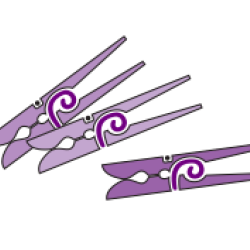Source Institutions
Source Institutions
Add to list Go to activity
Activity link broken? See if it's at the internet archive

In this activity about physical stress (page 28 of PDF), learners discover that muscles and bones need to work to stay strong. In part 1, learners investigate how physical stress can affect bone (a hard material) by bending plastic knives. In part 2, learners explore the effects of stress on the muscles in their hands by predicting and counting the number of times they can "click" a clothespin. Learners will conduct this experiment every other day for two weeks to discover that their muscles grow stronger with conditioning. This guide includes background information, extensions, and a data sheet.
- 5 to 10 minutes
- 1 to 4 weeks
- $1 - $5 per group of students
- Ages 6 - 11
- Activity, Experiment/Lab Activity, Lesson/Lesson Plan
- English
Quick Guide
Materials List (per group of students)
- overhead projector and screen
- transparent plastic knives
- clock with second hand or timer
- spring-hinge clothespins
- copies of "Stress This!" student sheet
Subjects
-
Life Sciences
-
Human Body
- Skeleton
- Muscles and Skin
- Health and Nutrition
-
Human Body
-
Mathematics
-
Data Analysis and Probability
- Data Analysis
- Data Collection
- Data Representation
-
Measurement
- Rate
- Reasoning and Proof
-
Data Analysis and Probability
-
Physical Sciences
-
Motion and Forces
- Gravity
-
Motion and Forces
-
The Nature of Science
-
The Scientific Process
- Conducting Investigations
- Gathering Data
- Formulating Explanations
- Communicating Results
-
The Scientific Process
Informal Categories
- Physical Activity
- Sports and Exercise
Audience
To use this activity, learners need to:
- see
- read
- touch
Learning styles supported:
- Involves teamwork and communication skills
- Involves hands-on or lab activities
Other
This resource is part of:
Access Rights:
- Free access
By:
- National Space Biomedical Research Institute; Chang, Kimberly ; Moreno, Nancy P. ; Tharp, Barbara Z.
Rights:
- All rights reserved, Baylor College of Medicine, 2000
Funding Source:
- NASA, NCC9-58
